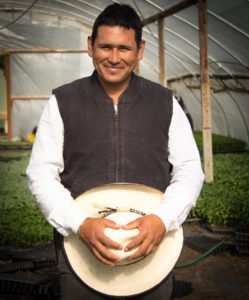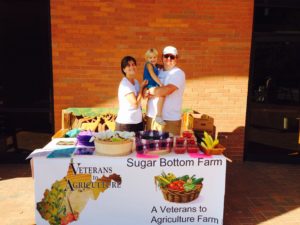
California Beginning farmer, Meredith Bell, owner and operator of Autonomy Farms, was hit by a flood that left her farm underwater for two months. She was able to financially recover from her poultry losses through the USDA Farm Service Agency (FSA) Livestock Indemnity Program (LIP).
By Farm Service Agency Acting Administrator Steve Peterson
Through many programs and opportunities, USDA provides support to beginning farmers and ranchers, veterans and people transitioning from other industries to agriculture.
According to the 2012 Census of Agriculture, there are a little over 469,000 new farmers across the country. The 2012 Census also shows that the average age of farmers continues to rise, with the average age being 58. We realize that now, more than ever, it is important to provide those interested in a career in agriculture with the tools they need to succeed so they are equipped to fill the shoes of those who have spent their lives caring for our land and forests and producing our food and fiber.
The USDA Farm Service Agency (FSA) offers beginning farmers and ranchers with direct and guaranteed loan programs. While farm ownership loans can provide access to land and capital, operating loans can assist beginning farmers in becoming prosperous and competitive by helping to pay normal operating or family living expenses, open doors to new markets and marketing opportunities, assist with diversifying operations and more. Through the microloan programs, beginning farmers and ranchers have an important source of financial assistance during the start-up years.
In addition to having access to FSA’s farm loans and other farm programs, beginning farmers and ranchers are also eligible for a service fee waiver and a 50 percent premium reduction when applying for the Noninsured Crop Disaster Assistance Program (NAP), which provides financial assistance to producers of noninsurable crops when low yields, loss of inventory, or prevented planting occur due to natural disasters. Qualifying beginning farmers or ranchers are individuals who have not operated a farm or ranch for more than 10 years and materially and substantially participate in the operation.

Beginning farmer, Ivan Tellez, worked with Idaho FSA staff to overcome a language barrier and secure a direct operating loan and farm ownership loan to expand his fruit and vegetable operation. (Photo credit: Kaylyn Franks, Idaho Farm Service Agency)
Last summer, Agriculture Secretary Perdue signed a Memorandum of Understanding with Steve Records, Vice-President of Field Operations for SCORE, to further the USDA mission of helping farmers start and continue farming. SCORE is the nation’s largest network of volunteer, expert business mentors, who support new and beginning farmers and ranchers, veterans, women, socially disadvantaged Americans and others to both grow and thrive in agribusiness.
In order to be successful, not only do farmers and ranchers need access to capital, land and equipment, but they also need advice and guidance from those who have been through the process of starting a business.
Through this partnership, USDA and SCORE reach and provide support to American farmers and ranchers to create profitable business operations with sustainable growth, which will create new jobs.
To do this, SCORE matches business professionals and entrepreneurs with beginning farmers and ranchers to mentor them through the process of starting and maintaining a new business. SCORE mentors partner with USDA and a wide array of groups already hard at work serving new and beginning farmers and ranchers, such as the FFA, 4-H, cooperative extension and land-grant universities, nonprofits, legal aid groups, banks, technical and farm advisors. These partnerships expand and integrate outreach and technical assistance between current and retired farmers and agribusiness experts and new farmers.

Eric Grandon, a veteran and beginning farmer, participates in the Noninsured Crop Disaster Assistance Program (NAP) and has had an FSA Microloan. The West Virginia producer also utilized the Emergency Assistance for Livestock, Honey Bees, and Farm-raised Fish Program (ELAP) after losing beehives to flash flooding.
SCORE mentorship is free, confidential and one-on-one. Participants can receive support on specific business questions and mentor support in various areas of expertise, such as business plan development, marketing strategies, cash flow management, and tax planning.
There are mentors available for participants just starting out and those looking to grow their business. Individuals with farming, ranching or other agribusiness experience can share their knowledge and experience by becoming a mentor to the farmers and ranchers of tomorrow.
If you’re seeking a mentor or interested in becoming one, sign up online and find out more information on the USDA New Farmers’ website at https://newfarmers.usda.gov/mentorship. For more information about FSA programs and services, visit https://www.fsa.usda.gov/.





